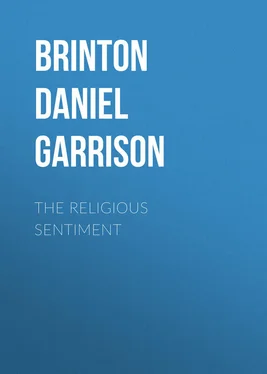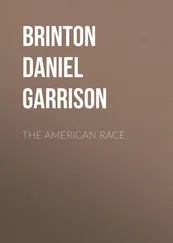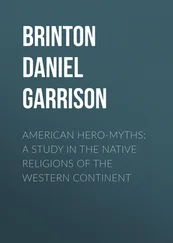Daniel Brinton - The Religious Sentiment
Здесь есть возможность читать онлайн «Daniel Brinton - The Religious Sentiment» — ознакомительный отрывок электронной книги совершенно бесплатно, а после прочтения отрывка купить полную версию. В некоторых случаях можно слушать аудио, скачать через торрент в формате fb2 и присутствует краткое содержание. ISBN: , Жанр: foreign_antique, foreign_prose, на английском языке. Описание произведения, (предисловие) а так же отзывы посетителей доступны на портале библиотеки ЛибКат.
- Название:The Religious Sentiment
- Автор:
- Жанр:
- Год:неизвестен
- ISBN:http://www.gutenberg.org/ebooks/30061
- Рейтинг книги:3 / 5. Голосов: 1
-
Избранное:Добавить в избранное
- Отзывы:
-
Ваша оценка:
- 60
- 1
- 2
- 3
- 4
- 5
The Religious Sentiment: краткое содержание, описание и аннотация
Предлагаем к чтению аннотацию, описание, краткое содержание или предисловие (зависит от того, что написал сам автор книги «The Religious Sentiment»). Если вы не нашли необходимую информацию о книге — напишите в комментариях, мы постараемся отыскать её.
The Religious Sentiment — читать онлайн ознакомительный отрывок
Ниже представлен текст книги, разбитый по страницам. Система сохранения места последней прочитанной страницы, позволяет с удобством читать онлайн бесплатно книгу «The Religious Sentiment», без необходимости каждый раз заново искать на чём Вы остановились. Поставьте закладку, и сможете в любой момент перейти на страницу, на которой закончили чтение.
Интервал:
Закладка:
In the early stages of religious life, whether in an individual or a nation, the latter is half concealed. Fear is more demonstrative, and as it is essentially destructive, its effects are more sudden and visible. In its acuter forms, as Fright and Terror, it may blanch the hair in a night, blight the mind and destroy the life of the individual. As Panic, it is eminently epidemic, carrying crowds and armies before it; while in the aggravated form of Despair it swallows up all other emotions and prompts to self destruction. Its physiological effect is a direct impairment of vitality.
Hope is less intense and more lasting than fear. It stimulates the system, elates with the confidence of control, strengthens with the courage derived from a conviction of success, and bestows in advance the imagined joy of possession. As Feuchtersleben happily expresses it: “Hope preserves the principle of duration when other parts are threatened with destruction, and is a manifestation of the innermost psychical energy of Life.” 29 29 Elements of Medical Psychology , p. 331.
Both emotions powerfully prompt to action, and to that extent are opposed to thought. Based on belief, they banish uncertainty, and antagonize doubt and with it investigation. The religion in which they enter as the principal factors will be one intolerant of opposition, energetic in deed, and generally hostile to an unbiased pursuit of the truth.
Naturally those temperaments and those physical conditions which chiefly foster these emotions will tend to religious systems in which they are prominent. Let us see what some of these conditions are.
It has always been noticed that impaired vitality predisposes to fear. The sick and feeble are more timorous than the strong and well. Further predisposing causes of the same nature are insufficient nourishment, cold, gloom, malaria, advancing age and mental worry. For this reason nearly invariably after a general financial collapse we witness a religious “revival.” Age, full of care and fear, is thus prompted to piety, willing, as La Rochefoucauld remarks, to do good by precept when it can no longer do evil by example. The inhabitants of swampy, fever-ridden districts are usually devout. The female sex, always the weaker and often the worsted one in the struggle for existence, is when free more religious than the male; but with them hope is more commonly the incentive than fear.
Although thus prominent and powerful, desire, so far as its fruition is pleasure, has expressed but the lowest emotions of the religious sentiment. Something more than this has always been asked by sensitively religious minds. Success fails to bring the gratification it promises. The wish granted, the mind turns from it in satiety. Not this, after all, was what we sought.
The acutest thinkers have felt this. Pascal in his Pensées has such expressions as these: “The present is never our aim. The future alone is our object.” “Forever getting ready to be happy, it is certain we never can be.” “’Tis the combat pleases us and not the victory. As soon as that is achieved, we have had enough of the spectacle. So it is in play, so it is in the search for truth. We never pursue objects, but we pursue the pursuit of objects.” But no one has stated it more boldly than Lessing when he wrote: “If God held in his right hand all truth, and in his left the one unceasingly active desire for truth, although bound up with the law that I should forever err, I should choose with humility the left and say: ‘Give me this, Father. The pure truth is for thee alone.’” 30 30 Lessing’s Gesammelte Werke . B. ii. s. 443 (Leipzig, 1855).
The pleasure seems to lie not in the booty but in the battle, not in gaining the stakes but in playing the game, not in the winning but in the wooing, not in the discovery of truth but in the search for it.
What is left for the wise, but to turn, as does the preacher, from this delusion of living, where laughter is mad and pleasure is vain, and praise the dead which are dead more than the living which are yet alive, or to esteem as better than both he that hath never been?
Such is the conclusion of many faiths. Wasted with combat, the mortal longs for the rest prepared for the weary. Buddha taught the extinguishment in Nirvana; the Brahman portrays the highest bliss as shanti , complete and eternal repose; and that the same longing was familiar to ancient Judaism, and has always been common to Christianity, numerous evidences testify. 31 31 See Exodus, xxiii. 12; Psalms, lv. 6; Isaiah, xxx. 15; Jeremiah, vi. 16; Hebrews, v. 9. So St. Augustine: “et nos post opera nostra sabbato vitæ eternæ requiescamus in te.” Confessionum Lib. xiii. cap. 36.
Few epitaphs are more common than those which speak of the mortal resting in pace, in quiete .
The supposition at the root of these longings is that action must bring fatigue and pain, and though it bring pleasure too, it is bought too dearly. True in fact, I have shown that this conflicts with the theory of perfect life, even organic life. The highest form of life is the most unceasing living; its functions ask for their completest well being constant action, not satisfaction. That general feeling of health and strength, that sens de bien être , which goes with the most perfect physical life, is experienced only when all the organs are in complete working order and doing full duty. They impart to the whole frame a desire of motion. Hence the activity of the young and healthy as contrasted with the inertness of the exhausted and aged.
How is it possible to reconcile this ideal of life, still more the hope of everlasting life, with the acknowledged vanity of desire? It is accomplished through the medium of an emotion which more than any I have touched upon reveals the character of the religious sentiment – Love. This mighty but protean feeling I shall attempt to define on broader principles than has hitherto been done. The vague and partial meanings assigned it have led to sad confusion in the studies of religions. In the language of feeling, love is a passion; but it does not spring from feeling alone. It is far more fervid when it rises through intellect than through sense. “Men have died from time to time, and worms have eaten them, but not for love,” says the fair Rosalind; and though her saying is not very true as to the love of sense, it is far less true as to the love of intellect. The martyrs to science and religion, to principles and faith, multiply a hundred-fold those to the garden god. The spell of the idea is what
Such love destroys the baser passion of sense, or transfigures it so that we know it no longer. The idea-driven is callous to the blandishments of beauty, for his is a love stronger than the love to woman. The vestal, the virgin, the eunuch for the kingdom of heaven’s sake are the exemplars of the love to God.
What common trait so marks these warring products of mind, that we call them by one name? In what is all love the same? The question is pertinent, for the love of woman, the love of neighbor, the love of country, the love of God, have made the positive side of most religions, the burden of their teachings. The priests of Cotytto and Venus, Astarte and Melitta, spoke but a more sensuous version of the sermon of the aged apostle to the Ephesians, – shortest and best of all sermons – “Little children, love one another.” 32 32 “Filioli, diligite alterutrum.” This is the “testamentum Johannis,” as recorded from tradition by St. Jerome in his notes to the Epistle to the Galatians.
The earliest and most constant sign of reason is “working for a remote object.” 33 33 Alexander Bain, The Senses and the Intellect , Chap. I.
Nearly everything we do is as a step to something beyond. Forethought, conscious provision, is the measure of intelligence. But there must be something which is the object, the aim, the end-in-view of rational action, which is sought for itself alone, not as instrumental to something else. Such an object, when recognized, inspires the sentiment of love. It springs from the satisfaction of reason.
Интервал:
Закладка:
Похожие книги на «The Religious Sentiment»
Представляем Вашему вниманию похожие книги на «The Religious Sentiment» списком для выбора. Мы отобрали схожую по названию и смыслу литературу в надежде предоставить читателям больше вариантов отыскать новые, интересные, ещё непрочитанные произведения.
Обсуждение, отзывы о книге «The Religious Sentiment» и просто собственные мнения читателей. Оставьте ваши комментарии, напишите, что Вы думаете о произведении, его смысле или главных героях. Укажите что конкретно понравилось, а что нет, и почему Вы так считаете.












